

Book. Relive one of the most important events in American history!
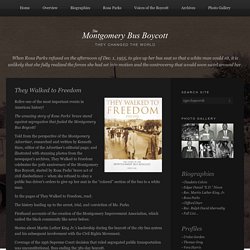
The amazing story of Rosa Parks’ brave stand against segregation that fueled the Montgomery Bus Boycott! Told from the perspective of the Montgomery Advertiser, researched and written by Kenneth Hare, editor of the Advertiser’s editorial page; and illustrated with stunning photos from the newspaper’s archives, They Walked to Freedom celebrates the 50th anniversary of the Montgomery Bus Boycott, started by Rosa Parks’ brave act of civil disobedience – when she refused to obey a public bus driver’s orders to give up her seat in the “colored” section of the bus to a white man.
In the pages of They Walked to Freedom, read: Pds/maai3/protest/text5/robinsonbusboycott.pdf. Annotated Bibliography - The Montgomery Bus Boycott. Rosa Parks and the Montgomery Bus Boycott. Rosa Parks rode at the front of a Montgomery, Alabama, bus on the day the Supreme Court's ban on segregation of the city's buses took effect.
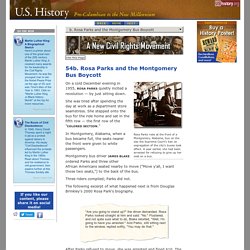
A year earlier, she had been arrested for refusing to give up her seat on a bus. On a cold December evening in 1955, Rosa Parks quietly incited a revolution — by just sitting down. She was tired after spending the day at work as a department store seamstress. She stepped onto the bus for the ride home and sat in the fifth row — the first row of the "Colored Section. " In Montgomery, Alabama, when a bus became full, the seats nearer the front were given to white passengers. Montgomery bus driver James Blake ordered Parks and three other African Americans seated nearby to move ("Move y'all, I want those two seats,") to the back of the bus. Three riders complied; Parks did not. The following excerpt of what happened next is from Douglas Brinkley's 2000 Rosa Park's biography. Sheg.stanford.edu/upload/Lessons/Unit 12_Cold War Culture and Civil Rights/Montgomery_INQUIRY1.pdf.
Montgomery Bus Boycott - Black History. As news of the boycott spread, African-American leaders across Montgomery, Alabama’s capital city, began lending their support.

Effects Of Montgomery Bus Boycott. Effects Of Montgomery Bus Boycott Nixon, the president of the local NAACP chapter, met with community leaders and local ministers the same evening of Rosa Parks arrest and formed the Montgomery Improvement Association.

A young minister named Martin Luther King, Jr. was elected the president of this organization. In addition, a college professor named Jo Ann Robinson distributed flyers requesting African Americans to boycott buses on Monday 5th December 1955. The Montgomery Improvement Association wanted to have a compromise with the city and even proposed having a dividing line in the bus, so that one half of the bus would be meant for the Whites and the other half for the African Americans. The idea was that all bus passengers be treated equally regardless of their color. Leaflet, “Don’t Ride the Bus,” Come to a Mass Meeting on 5 December. Montgomery Bus Boycott (1955-1956) Sparked by the arrest of Rosa Parks on 1 December 1955, the Montgomery bus boycott was a 13-month mass protest that ended with the U.S.
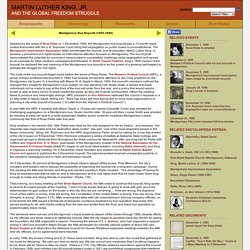
Supreme Court ruling that segregation on public buses is unconstitutional. The Montgomery Improvement Association (MIA) coordinated the boycott, and its president, Martin Luther King, Jr., became a prominent civil rights leader as international attention focused on Montgomery. The bus boycott demonstrated the potential for nonviolent mass protest to successfully challenge racial segregation and served as an example for other southern campaigns that followed. ADAH: Alabama Moments (Montgomery Bus Boycott. The Montgomery Advertiser article (December 4, 1955) reporting the start of the Boycott: Text of flyer circulated by Montgomery Improvement Association following settlement of boycott:
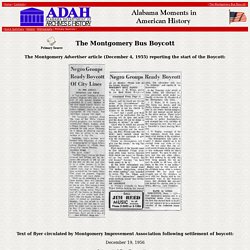
Bus_Integration.pdf. Abama Archives: Riding the Bus. Source:Inez Jessie Baskin Papers, Alabama Department of Archives and History, Montgomery, Alabama.
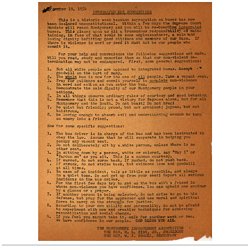
Www.tolerance.org/sites/default/files/documents/Negroes_Boycott.pdf. Www.tolerance.org/sites/default/files/documents/Minister_Convicted.pdf. Www.tolerance.org/sites/default/files/documents/Negroes_Boycott.pdf. Abama Archives: Riding the Bus. Source:Alabama Department of Archives and History Public Information Subject Files - General File, Bus Boycott, SG6945, folder 305b.
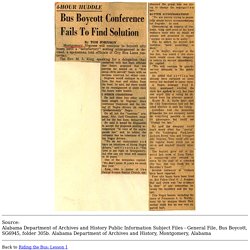
Abama Archives: Teacher lesson plans, Civil Rights Movement, Lesson 1, Riding the Bus. To Next Page.
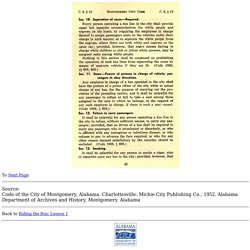
Abama Archives: Teacher lesson plans, Civil Rights Movement, Lesson 1, Riding the Bus.